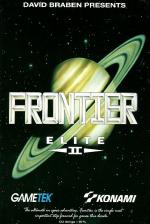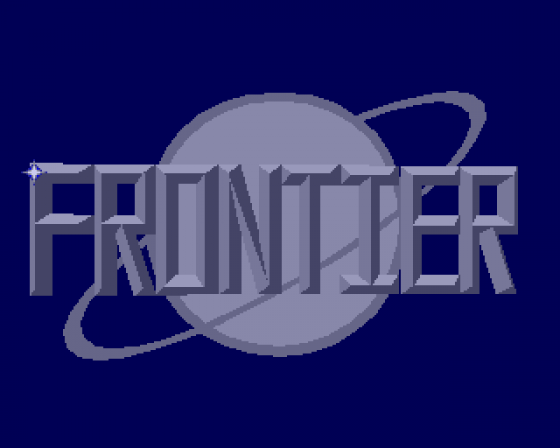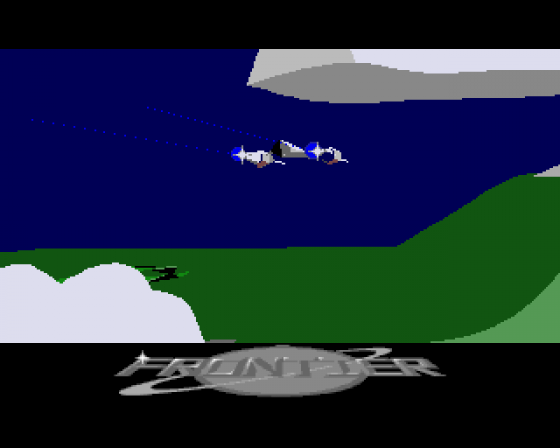
Amiga Power
 1st December 1993
1st December 1993
Categories: Review: Software
Author: Richard Longhurst
Publisher: Konami
Machine: Amiga 500
Published in Amiga Power #32
You know, they said that Elite was pretty fronty. But Elite II - is Frontier!
Frontier: Elite II
Think of your grandparents and you think of grey hair, afternoon tea, false teeth, deaf aids and your grandma's slightly prickly face when you kiss her goodnight. You probably find it quite hard to think of them as young, vigorous, and, erm - how can I put this? - romantically active. Go on, mull it over for a bit. For all you know, your grandfather might have been the latter-day equivalent of Adam Clayton, taking part in three-in-a-bed pyjama parties with all the cutesy pre-war babes. Though this was obviously before he met your grandmother and settled down to raise those fine, upstanding and decent folk, your parents.
Hey, hang on a minute, don't turn away now, you've got to face up to it - because that's the background to your character in Frontier. Your grandfather, Commander Peter Jameson (The main man in Elite) was not only a top space hero, he was an insatiable sex stallion. He charmed his way around the galaxy, sowing his wild oats in every seedy spaceport, shanty town and massage parlour from Ayargre to Zelada. You, as one of his thousands of surviving progeny, have inherited a small part of his fortune, namely an Eagle long-range fighter and 100 credits.
However flippant the notion that your grandfather has spawned thousands of space cadets throughout the galaxy, it unintentionally provides a clue as to what could be one of Frontier's best features. It retrospectively reflects the notion that actions have consequences, that you can't operate in a vacuum and ignore what effect you have on your surroundings. Frontier could be one of the bravest games in that it's one of the few titles that devotes any attention in trying to tackle this cause-and-effect concept on a grand scale.
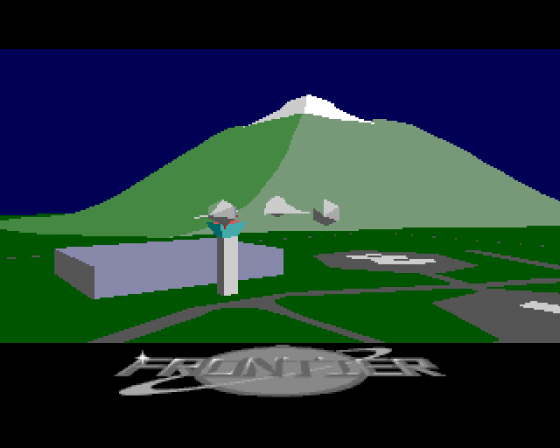
In nearly all RPGs and adventures you can do pretty much whatever you want, without fear of reproach or recrimination. You can wander around killing people and nicking stuff without fearing the consequences. Legends Of Valour was one of the few games to incorporate a penal system to punish your misdemeanours, and Frontier has one too. But David Braben has taken the concept a step further - not only are bad deeds such as dumping radioactive waste or firing a laser in a restricted zone noted, your successes are also recorded.
Bland Ambition?
There's no single objective in the game, you can set your own target, for example to get the biggest ship, to get the highest 'Elite' rating, or to climb to the top of the Federation or Empire rankings, but your actions are also reflected in other, subtler ways. People who you've assassinated are likely to have friends who will want revenge, the Federation won't want Empire pilots to fly missions for it, passengers won't sit around in your cabins for weeks on end waiting to get to their destination, and the police always know who you are and what you owe them.
This aspect of the game is far more interesting and involving than the anally retentive accurate mapping of more than 100,000,000,000 stars. The creation of a real, believable and exciting gameworld does not lie in the lengthy mind-numbing number-crunching process of taking the whole galaxy and fitting it accurately and neatly in a one meg Amiga. Sure, it's an admirable achievement, but it's also rather a pointless and meaningless one, and here's why.

Say you're living with Stuart and Mark in Bath, and you've got a bit of time on your hands so you want a bit of work. Mark asks you to take a top secret package to Birmingham and he'll pay you £25. You know roughly how far away Brum is, so you can work out how much hassle it's going to be, how much it's going to cost and whether the trip's worth making at all.
Stuart then pops up and offers you £50 to take a package to Edinburgh. Likewise, you immediately know how far away it is, how much it'll cost you and whether you can make any money on the deal. You can even work out which is the better trip to make, and as a result your life is enriched by being able to make a sensible and informed strategic decision and knowing that you're on to a good earner.
Now, say you're playing Frontier with its 100,000,000,000 accurately mapped planets, and are living on Mars with Stuart and Mark (which is not as far-fetched as it sounds). Stuart's got 340 credits for you if you take a package to a planet in the Formalhaut system, while Mark's got 300 credits if you take a trip to Alpha Centauri. Such huge distances are not only so huge and unfamiliar as to be almost incomprehensible in themselves, but when you try to compare one incomprehensible distance with another, you're bound to be wasting your time.
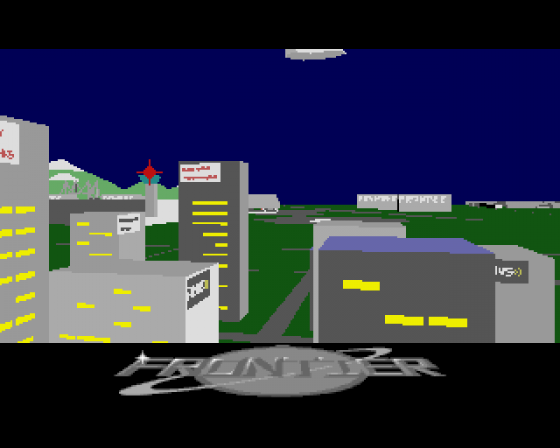
You know that Edinburgh's further away from Bath than Birmingham, you can relate to the distances and you can estimate how much you should get paid. Unless you're an avid astronomer, there's no way you can know whether Formalhaut or Alpha Centauri is closer to Mars, there's no way you can relate to the distances, so there's no way you can decide (a) how much you should get paid for either trip, or (b) which of the two tips offers the best deal. This means that when you're choosing missions in Frontier, you're often taking totally meaningless decisions. As you might imagine, this is a real shame and a total bummer as far as gameplay and strategy is concerned.
Start Trekking: Across The Universe
Some sad deluded fellows might be foaming at the mouth at the prospect of being able to fly across the galaxy from one planet to another to see a moon rise above Saturn, or being able to cruise right down on to a heavenly body to visit a favourite city. But such interplanetary travel is also rather pointless. Imagine your disappointment after trekking across the galaxy to find that Saturn isn't an incredibly spectacular sight, rather a circular series of plain polygons with a few blobs of surface colour. Or arriving at your chosen city to discover that even on medium detail its presence slows the screen update to a painfully slow rate. There's even more disappointment in store when you realise that all you can do is fly over the cities - you can't actually blow anything up. Shame. Still, if you're into looking at jerky but reasonably detailed 3D filled-polygon graphics, you could do a lot worse than this.
As if this wasn't enough, you never get a feeling for the magnitude of the distances involved in inter-planetary travel because you can accelerate the game time. It's a common feature in flight sims, which usually enable you to accelerate time by a factor of two, four or eight to reduce the real time you spend flying from waypoint to waypoint. Frontier has a similar feature, enabling you to accelerate time by factors of 10, 100, 1000 or 10,000, so every tedious uneventful journey takes roughly the same amount of real time. It all boils down to take off, select your approximate system destination, jump into hyperspace, select your precise planetary destination, switch to autopilot, accelerate time and wait. We are talking Dullsville, Missouri.

If you have the misfortune to be waylaid by pirates or other marauding bloodthirsty fiends, you're in for a spot of 3D space combat. This can be a lot of fun if you've got an A1200 and you're in a real mutha of a ship that's bristling with lasers, turrets and missiles. But when you're got a 500 and you're flying the dog of a ship that you start off with, combat is remarkably unexciting - you can barely catch a glimpse of your opponent before it scoots off the screen. The manual tells you to run away if possible, which is sound advice, even if it is an incredibly soporific tactic - if you want a 3D blast fest and you've got an A1200, go for Wing Commander every time.
The excitement in a computer game comes from character interaction, action-packed flights and good-looking locations, not being able to fly from Jupiter to Earth, with the journey taking exactly the right amount of time. The gameplay should be all about the cut and thrust of intergalactic living, wheeling and dealing in the space lanes of life. Frontier gives you lots of that, but it's hidden behind all the astronomical nonsense. The precise positioning of the planets should be a subsidiary factor, not an overbearing, burdensome weight that you're reminded of every time you want to take a shipload of secret plans from Uszaa to Ioinack, while avoiding the geezer in the Kestrel airfighter who wants to avenge the murder of his travesvestite lover. OK, so maybe I made up the last bit, but you get the point.
Secret Lives Of The Stars
Frontier could make you scared to want to fly your ship at night because the boys you insulted down the pub might be waiting round the corner to beat you up. Instead, it makes you terrified of taking off because the navigation system is so clumsy, the planets are so far apart and flying simply isn't very exciting.

Let's look at it another way. If you had to sell the sequel to one of the biggest-selling and best games of the 1980s, and you were convinced that it was the absolute business, you'd probably be bursting with exciting things to say. The marketing hypesters at Gametek must have been frothing up in their silk boxer shorts at the prospect of flogging Frontier to an Elite-loving public, so here's a digest of what they had to say about the most exciting game of the '90s.
Cue drum roll and announcer with pompous voice. "The four main features as outlined on the back of Frontier's box, in Gametek's order:
- An intro sequence
- Some music
- 100,000,000,000 planets generated in accordance with current theories of planet formation
- Fly 82 basic missions or don't play the missions at all."
Exciting stuff, we think you'll agree. To be fair (are we ever anything but?) there is some other stuff about Frontier being the sequel to Elite, and it being very big, and it being in the same style as Elite, oh yes, and it being bid. Between you, me, the Amiga Power crew and 55,000 other Amiga Power readers, I reckon this reflects the fact that Gametek has a deep-rooted insecurity that Frontier is not quite as impressive as it should have been. Size certainly isn't everything. If they were scrabbling around for things to say about what's supposed to be in the ultimate space game, then you begin to get a sneaking suspicion that even they think it's gone well past its play-by-date.

Frontier is by no means a disaster - it can be very engrossing and absorbing (you should see the amount of red wine it mopped up off my lounge carpet) - but equally it's not the revolutionary wundergame that most of us were either hoping or expecting for. The fun's not instant, it's not even a slow bake for couple of hours on gas mark six, it's make the Christmas pudding in October and leave it in the fridge for a couple of months before you even think about taking it anywhere near the oven (if you catch my drift). Even though there's eventually plenty of entertainment value for your £34.99, you have to play long and hard before you see any worthwhile results.
Whether it's David Braben's obsession with astronomy, the tedious navigation system or the slow and unspectacular polygon graphics, you can't help thinking that life's too short, that there must be better games to play than this. Yes, we all sigh in a resigned manner, it's a marvellous technical achievement to cram the entire galaxy onto a couple of disks. Yes, these might be some of the best 3D environments we've ever seen on the Amiga. Yes, there's limitless gameplay time, but even so, it has to be said that Frontier is just not very much fun.
Remember that word? Fun, it had something to do with playing games and enjoying yourself...
The Bottom Line
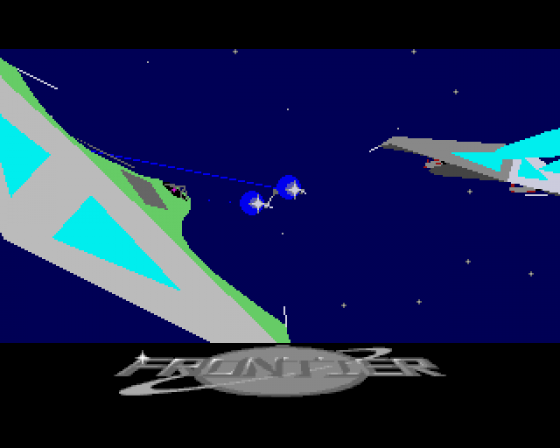
Uppers: Loads of missions, characters, trading, exploring, mining and fighting. Huge gameworld in which you have free rein to do whatever you want.
Downers: But in practice, that's not as much fun as it sounds. It's slow at the start, and size definitely isn't everything. The flying around and the combat parts aren't nearly as exciting as they should be.
Plenty of strategy and character detail to make it a good game, but so much baggage that's either disappointing (the 3D), pointless (the 100,000,000,000 planets) or tedious (the navigation and combat).
A1200 Version
Largely the same criticisms, but it's much smoother and faster. The detailed planets are almost worthwhile and the combat bits are actually playable.

